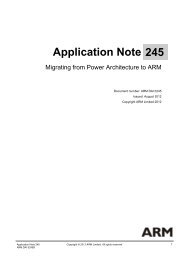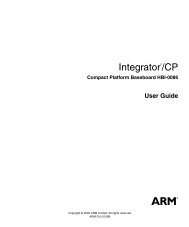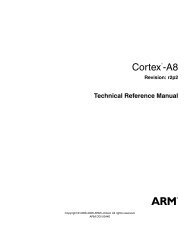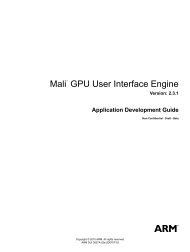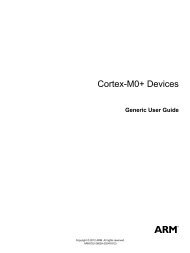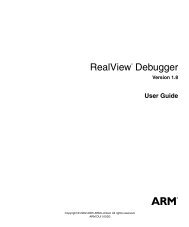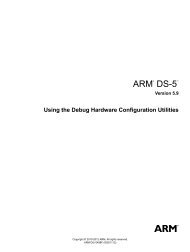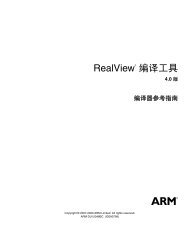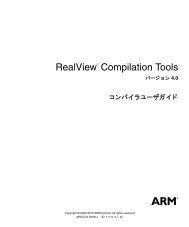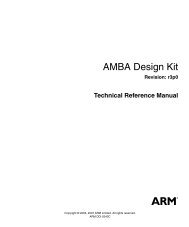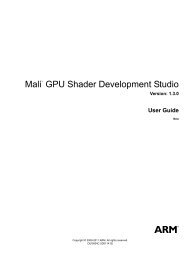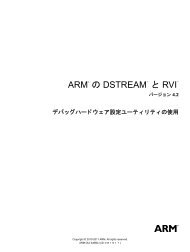- Page 1 and 2:
® RealView Compilation Tools Versi
- Page 3 and 4:
Contents RealView Compilation Tools
- Page 5 and 6:
Preface This preface introduces the
- Page 7 and 8:
Preface Appendix A Via File Syntax
- Page 9 and 10:
Preface • ARM datasheet or techni
- Page 11 and 12:
Chapter 1 Introduction This chapter
- Page 13 and 14:
Introduction 1.2 Source language mo
- Page 15 and 16:
Introduction 1.3 Language extension
- Page 17 and 18:
Introduction • Compiling a C sour
- Page 19 and 20:
Chapter 2 Compiler Command-line Opt
- Page 21 and 22:
Compiler Command-line Options 2.1.2
- Page 23 and 24:
Compiler Command-line Options Defau
- Page 25 and 26:
Compiler Command-line Options Note
- Page 27 and 28:
Compiler Command-line Options Table
- Page 29 and 30:
Compiler Command-line Options int m
- Page 31 and 32:
Compiler Command-line Options See a
- Page 33 and 34:
Compiler Command-line Options • -
- Page 35 and 36:
Compiler Command-line Options • T
- Page 37 and 38:
Compiler Command-line Options Where
- Page 39 and 40:
Compiler Command-line Options Defau
- Page 41 and 42:
Compiler Command-line Options Mode
- Page 43 and 44:
Compiler Command-line Options Defau
- Page 45 and 46:
Compiler Command-line Options • #
- Page 47 and 48:
Compiler Command-line Options Synta
- Page 49 and 50:
Compiler Command-line Options 2.1.3
- Page 51 and 52:
Compiler Command-line Options See a
- Page 53 and 54:
Compiler Command-line Options 2.1.4
- Page 55 and 56:
Compiler Command-line Options When
- Page 57 and 58:
Compiler Command-line Options Examp
- Page 59 and 60:
Compiler Command-line Options A num
- Page 61 and 62:
Compiler Command-line Options softv
- Page 63 and 64:
Compiler Command-line Options If --
- Page 65 and 66:
Compiler Command-line Options • I
- Page 67 and 68:
Compiler Command-line Options Examp
- Page 69 and 70:
Compiler Command-line Options See a
- Page 71 and 72:
Compiler Command-line Options 2.1.7
- Page 73 and 74:
Compiler Command-line Options • -
- Page 75 and 76:
Compiler Command-line Options N #if
- Page 77 and 78:
Compiler Command-line Options 2.1.7
- Page 79 and 80:
Compiler Command-line Options • -
- Page 81 and 82:
Compiler Command-line Options Defau
- Page 83 and 84:
Compiler Command-line Options 2.1.8
- Page 85 and 86:
Compiler Command-line Options 1 Res
- Page 87 and 88:
Compiler Command-line Options Defau
- Page 89 and 90:
Compiler Command-line Options Restr
- Page 91 and 92:
Compiler Command-line Options • #
- Page 93 and 94:
Compiler Command-line Options Synta
- Page 95 and 96:
Compiler Command-line Options Note
- Page 97 and 98:
Compiler Command-line Options Restr
- Page 99 and 100:
Compiler Command-line Options Note
- Page 101 and 102:
Compiler Command-line Options • S
- Page 103 and 104:
Compiler Command-line Options Examp
- Page 105 and 106:
Compiler Command-line Options See a
- Page 107 and 108:
Compiler Command-line Options --no_
- Page 109 and 110:
Compiler Command-line Options Defau
- Page 111 and 112:
Compiler Command-line Options --apc
- Page 113 and 114:
Compiler Command-line Options Selec
- Page 115 and 116:
Chapter 3 Language Extensions This
- Page 117 and 118:
Language Extensions 3.1.2 #include_
- Page 119 and 120:
Language Extensions 3.2 C99 languag
- Page 121 and 122:
Language Extensions 3.3 C99 languag
- Page 123 and 124:
Language Extensions Example void co
- Page 125 and 126:
Language Extensions static int y =
- Page 127 and 128:
Language Extensions 3.4.4 Dollar si
- Page 129 and 130:
Language Extensions 3.5 Standard C+
- Page 131 and 132:
Language Extensions Example 3-2 Lin
- Page 133 and 134:
Language Extensions 3.6 Standard C
- Page 135 and 136:
Language Extensions 3.6.4 Assembler
- Page 137 and 138:
Language Extensions 3.6.12 Structur
- Page 139 and 140:
Language Extensions 3.7 GNU languag
- Page 141 and 142:
Language Extensions 3.7.5 Character
- Page 143 and 144:
Language Extensions 3.7.10 Inline T
- Page 145 and 146:
Language Extensions Example int bar
- Page 147 and 148:
Chapter 4 Compiler-specific Feature
- Page 149 and 150:
Compiler-specific Features Usage __
- Page 151 and 152:
Compiler-specific Features Example
- Page 153 and 154:
Compiler-specific Features 4.1.6 __
- Page 155 and 156:
Compiler-specific Features Example
- Page 157 and 158:
Compiler-specific Features 4.1.11 _
- Page 159 and 160:
Compiler-specific Features short x;
- Page 161 and 162:
Compiler-specific Features Where: s
- Page 163 and 164:
Compiler-specific Features typedef
- Page 165 and 166:
Compiler-specific Features • 0-25
- Page 167 and 168:
Compiler-specific Features Usage Fu
- Page 169 and 170:
Compiler-specific Features 4.1.20 _
- Page 171 and 172:
Compiler-specific Features 4.2.2 __
- Page 173 and 174:
Compiler-specific Features }; __dec
- Page 175 and 176:
Compiler-specific Features 4.3 Func
- Page 177 and 178:
Compiler-specific Features The comp
- Page 179 and 180:
Compiler-specific Features Note Thi
- Page 181 and 182:
Compiler-specific Features In the f
- Page 183 and 184:
Compiler-specific Features 4.4 Type
- Page 185 and 186:
Compiler-specific Features void cal
- Page 187 and 188:
Compiler-specific Features replaced
- Page 189 and 190:
Compiler-specific Features Note Thi
- Page 191 and 192:
Compiler-specific Features Example
- Page 193 and 194:
Compiler-specific Features 4.5.9 __
- Page 195 and 196:
Compiler-specific Features 4.6 Prag
- Page 197 and 198:
Compiler-specific Features • Temp
- Page 199 and 200:
Compiler-specific Features Syntax #
- Page 201 and 202:
Compiler-specific Features #pragma
- Page 203 and 204:
Compiler-specific Features • __at
- Page 205 and 206: Compiler-specific Features 4.6.20 #
- Page 207 and 208: Compiler-specific Features If the i
- Page 209 and 210: Compiler-specific Features 4.7 Inst
- Page 211 and 212: Compiler-specific Features 4.7.3 __
- Page 213 and 214: Compiler-specific Features Example
- Page 215 and 216: Compiler-specific Features Where: c
- Page 217 and 218: Compiler-specific Features Return v
- Page 219 and 220: Compiler-specific Features See also
- Page 221 and 222: Compiler-specific Features Syntax v
- Page 223 and 224: Compiler-specific Features Where: p
- Page 225 and 226: Compiler-specific Features Syntax v
- Page 227 and 228: Compiler-specific Features Where: v
- Page 229 and 230: Compiler-specific Features Note The
- Page 231 and 232: Compiler-specific Features 4.7.33 _
- Page 233 and 234: Compiler-specific Features • BKPT
- Page 235 and 236: Compiler-specific Features sat must
- Page 237 and 238: Compiler-specific Features Syntax v
- Page 239 and 240: Compiler-specific Features Example
- Page 241 and 242: Compiler-specific Features See also
- Page 243 and 244: Compiler-specific Features unsigned
- Page 245 and 246: Compiler-specific Features int32_t
- Page 247 and 248: Compiler-specific Features See also
- Page 249 and 250: Compiler-specific Features 4.8 Comp
- Page 251 and 252: Compiler-specific Features Table 4-
- Page 253 and 254: Compiler-specific Features Table 4-
- Page 255: Chapter 5 C and C++ Implementation
- Page 259 and 260: C and C++ Implementation Details Se
- Page 261 and 262: C and C++ Implementation Details Po
- Page 263 and 264: C and C++ Implementation Details
- Page 265 and 266: C and C++ Implementation Details st
- Page 267 and 268: C and C++ Implementation Details 5.
- Page 269 and 270: C and C++ Implementation Details No
- Page 271 and 272: C and C++ Implementation Details na
- Page 273 and 274: C and C++ Implementation Details 5.
- Page 275 and 276: Appendix A Via File Syntax This app
- Page 277 and 278: Via File Syntax A.2 Syntax Via file
- Page 279 and 280: Appendix B Standard C Implementatio
- Page 281 and 282: Standard C Implementation Definitio
- Page 283 and 284: Standard C Implementation Definitio
- Page 285 and 286: Standard C Implementation Definitio
- Page 287 and 288: Standard C Implementation Definitio
- Page 289 and 290: Appendix C Standard C++ Implementat
- Page 291 and 292: Standard C++ Implementation Definit
- Page 293 and 294: Standard C++ Implementation Definit
- Page 295 and 296: Appendix D C and C++ Compiler Imple
- Page 297 and 298: C and C++ Compiler Implementation L
- Page 299 and 300: C and C++ Compiler Implementation L
- Page 301 and 302: Appendix E Using NEON Support This
- Page 303 and 304: Using NEON Support E.2 Vector data
- Page 305 and 306: Using NEON Support • Vector satur
- Page 307 and 308:
Using NEON Support Vector add high
- Page 309 and 310:
Using NEON Support Vector saturatin
- Page 311 and 312:
Using NEON Support uint64x1_t vqsub
- Page 313 and 314:
Using NEON Support uint32x2_t vcle_
- Page 315 and 316:
Using NEON Support uint16x4_t vabd_
- Page 317 and 318:
Using NEON Support Long pairwise ad
- Page 319 and 320:
Using NEON Support int16x8_t vqshlq
- Page 321 and 322:
Using NEON Support uint8x8_t vrshr_
- Page 323 and 324:
Using NEON Support Vector signed->u
- Page 325 and 326:
Using NEON Support uint8x16_t vld1q
- Page 327 and 328:
Using NEON Support int64x1_t vld1_l
- Page 329 and 330:
Using NEON Support // VST1.16 {d0[0
- Page 331 and 332:
Using NEON Support // VLD3.32 {d0,
- Page 333 and 334:
Using NEON Support // VLD3.16 {d0[]
- Page 335 and 336:
Using NEON Support // VLD3.32 {d0[0
- Page 337 and 338:
Using NEON Support void vst2_u64(__
- Page 339 and 340:
Using NEON Support void vst2q_lane_
- Page 341 and 342:
Using NEON Support float32_t vget_l
- Page 343 and 344:
Using NEON Support uint8x16_t vdupq
- Page 345 and 346:
Using NEON Support uint16x4_t vget_
- Page 347 and 348:
Using NEON Support E.3.25 Operation
- Page 349 and 350:
Using NEON Support int16x8_t vmulq_
- Page 351 and 352:
Using NEON Support Vector widening
- Page 353 and 354:
Using NEON Support Absolute: Vd[i]
- Page 355 and 356:
Using NEON Support uint8x8_t vmvn_u
- Page 357 and 358:
Using NEON Support int16x8_t vornq_
- Page 359 and 360:
Using NEON Support uint32x4x2_t vuz



